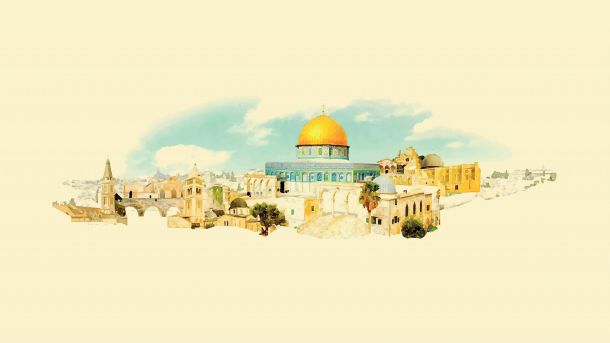News Archive
Nov 6, 2022
Using Vessels of Gold and Silver in General
Imām Muḥammad ibn Ṣāliḥ al-ʿUthaymīn [d. 1421 AH] said [concerning the issue of using vessels made from gold and silver]:
What is correct in this issue is that utilising such vessels for things other than eating and drinking is not ḥarām. This is because the Prophet (ﷺ) forbade a specific usage which is confined to the utilisation of such vessels for eating and drinking. If other than it was ḥarām, the Prophet (ﷺ) being from among the most eloquent of mankind and the most transparent [in speech] would have alluded to [the prohibitory nature of these other usages] without specifying certain a…
Nov 5, 2022
The Contradictory Beliefs of the Christians in “One God”
Shaykh al-Islām Ibn Taymiyyah (d. 728 AH) said:
“The Christians say: ‘God is One, the Creator is One, the Sustainer is One.’
This [phrase] is true in and of itself except that the Christians contradict this in the words of their own creed: ‘We believe in one God; Jesus the Messiah, the only son of God. The true God from the true God. Made from the essence of his Father, equal to Him in essence.’
Here, the Christians have confirmed the existence of two gods followed by the Holy Spirit as a third by claiming that they prostrate before him. Thus, they confirm three [different] gods.
They th…
Nov 2, 2022
The Ruling on Using the Cookware of Non-Muslims
Imām Muḥammad ibn Ṣāliḥ Al-ʿUthaymīn [d. 1412 AH] said:
As for the vessels used by the disbelievers, they are permissible [for us]. If someone was to say to us: What is the evidence?
We reply: The general [meaning] of the saying of the Most High:
هُوَ الَّذِي خَلَقَ لَكُم مَّا فِي الْأَرْضِ جَمِيعًا ﴿٢٩﴾
‘It is He who created for you all of that which is on the earth.’
[Al-Baqarah, 2:29]
If Allāh has already made the food of the People of the Book [Jews and Christians] permissible for us, then it is well-known that sometimes they will bring it to us cooked in their vessels. Also, it is co…
Nov 1, 2022
A Woman Changing Her Last Name after Marriage
Most married women replace their last names which are called their maiden names with their husbands’ last names. A few women, however, may attach their maiden names to their husbands’ last names to form a compound last name. Although this is a common practice in the Western Hemisphere, a Muslim woman must not modify her name after marriage. From the numerous reasons for this is the following:
1.
[A] Allāh’s statement:
ادْعُوهُمْ لِآبَائِهِمْ هُوَ أَقْسَطُ عِندَ اللَّهِ
“Call them after their fathers. This is more just before Allāh.”
[Al-Aḥzāb, 33:5]
[B] Allāh’s statement:
وَمَرْيَمَ ابْنَتَ…
Oct 26, 2022
The Disbelievers’ Hearts are Sealed – They Hear The Message But It Does Not Avail Them
Imām Ibn al-Qayyim [d. 751 AH] said:
“The eighth [type of guidance] is the level of acquaintance. Allāh says:
وَلَوْ عَلِمَ اللَّهُ فِيهِمْ خَيْرًا لَّأَسْمَعَهُمْ ۖ وَلَوْ أَسْمَعَهُمْ لَتَوَلَّوا وَّهُم مُّعْرِضُونَ ﴿٢٣﴾
‘Had Allāh known any good in them [the disbelievers], He would have made them hear. And if He had made them hear, they would [still] have turned away, while they were refusing.’
[Al-Anfāl, 8:23]
and Allāh also says:
وَمَا يَسْتَوِي الْأَعْمَىٰ وَالْبَصِيرُ ﴿١٩﴾ وَلَا الظُّلُمَاتُ وَلَا النُّورُ ﴿٢٠﴾ وَلَا الظِّلُّ وَلَا الْحَرُورُ ﴿٢١﴾ وَمَا يَسْتَوِي الْأَحْيَاءُ…
Oct 22, 2022
Why Do Some Muslims Perceive Prayer as a Hardship?
Allāh says:
وَاسْتَعِينُوا بِالصَّبْرِ وَالصَّلَاةِ ۚ وَإِنَّهَا لَكَبِيرَةٌ إِلَّا عَلَى الْخَاشِعِينَ ﴿٤٥﴾
‘And seek help through patience and prayer, and indeed, it is difficult except for the humbly submissive [to Allah].’
[Al-Baqarah, 2:45]
Imām Abū Jaʿfar Muḥammad ibn Jarīr al-Ṭabarī [d. 310 AH] said:
The true meaning of this verse is: Seek help in fulfilling [the tenants of] My covenant [with you] through the practice of patience and prayer, towards achievement of this fulfilment. Prayer is indeed a hardship, except for the ones who fear My torment, humbly submitting themselves befor…
Oct 19, 2022
The Highest Degree of Iḥsān
Al-Ḥāfiẓ Ibn Rajab relates:
“Ibrāhīm ibn Adham said: ‘The highest degree [of Iḥsān] is to cut off [from everything] except your Lord. To seek comfort from Him with your heart, mind, and all your limbs. To the point where you do not possess hope from anything except your Lord. You do not fear except your own sin. Your love for Him becomes so firmly rooted in your heart that nothing could ever cause it to waiver. If you were to reach such a state, you would find yourself lacking concern over [your place on earth], be it land or sea, plain or mountains.
Rather your yearning to meet your belov…








